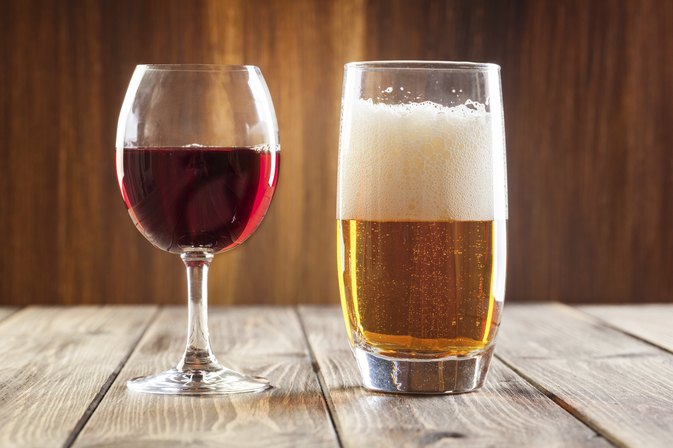
Calories
Four substances provide calories the human body can use for energy: fat, protein, carbohydrates and alcohol. Proteins and carbs have four calories per gram, one gram of fat has nine calories, and on gram of alcohol provides seven calories.
Carbs
If you are on a low-carb weight-loss diet, you can drink some alcoholic drinks in moderation. Spirits such as brandy or rum contain no carbs. One 4-oz. serving of red wine has 2 g of carbs, and 4 oz. of white wine provides 0.9 g. Carbs in beer vary depending on the brand, but a 12-oz. can of regular beer contains around 12 g of carbohydrates. You should not consume more than two drinks daily on any diet, and even some low-carb diets prohibit any alcohol.
Consideration
The body cannot store alcohol; when you drink an alcoholic drink, your body will burn the alcohol for energy. This leads to the interruption of other processes such as fat burning and the absorption of nutrients.

Alcohol provides your body with calories, although these calories do not typically provide nutritional benefits such as protein, minerals or vitamins. Therefore, the calories consumed in alcohol are considered to be nutritionally empty.
Calories by Weight
In a pure form, alcohol has a calorie content of approximately seven calories per gram. In alcoholic beverages such as beer, wine or liquor, alcohol is diluted by the water content of these drinks. In the United States, liquor defined as 100 proof is actually only 50 percent alcohol. Therefore, 20 grams of liquor at 100 proof would contain 10 g of alcohol. This would equate to approximately 70 calories from alcohol.
Calories by Volume
There are approximately 150 calories in each of the following drink measures: 1.5 ounces of distilled liquor, 12 ounces of beer and a 5-ounce glass of wine. The calorie content of distilled liquor is higher than that of the same volume of beer or wine because the liquor has a higher alcohol concentration and content per fluid ounce.
Warning
Heavy alcohol consumption can cause damage to your liver, and may be a sign of alcoholism. If you are following a calorie-restricted diet, you may find that alcohol has a greater effect on you. It is believed that drinking significant amounts of alcohol during pregnancy may be dangerous to the developing fetus.
Source: livestrong.com
Don't forget to share and like this post!


